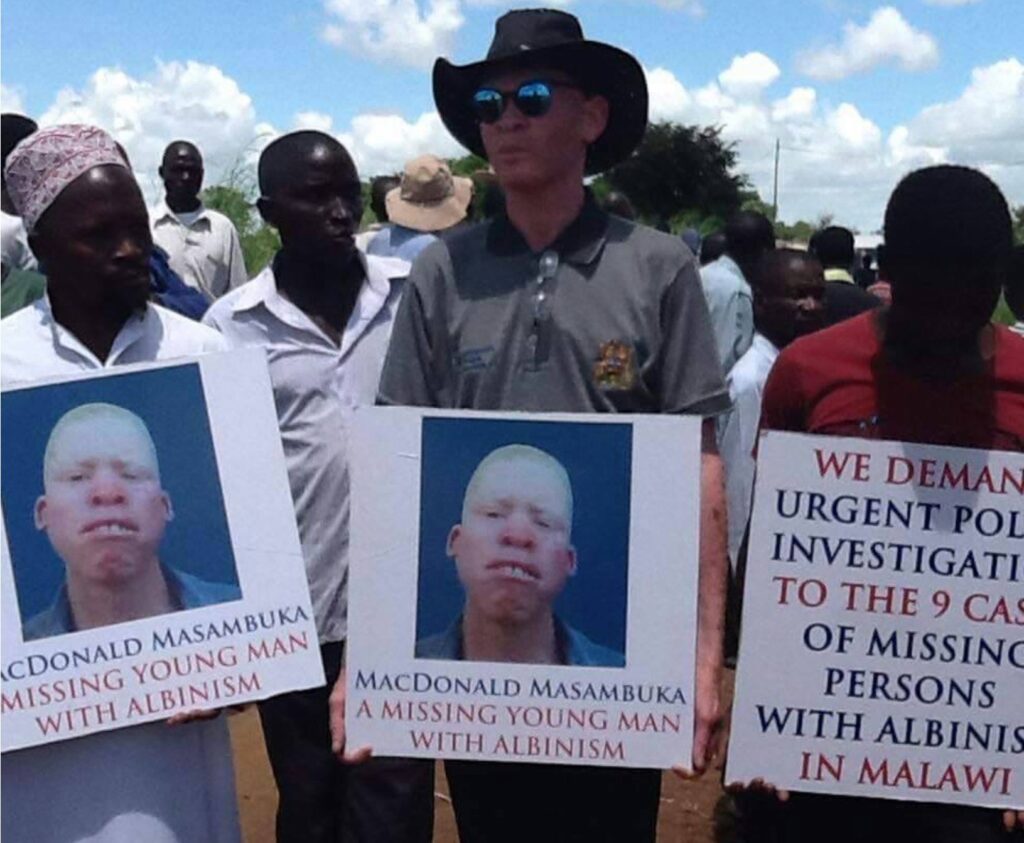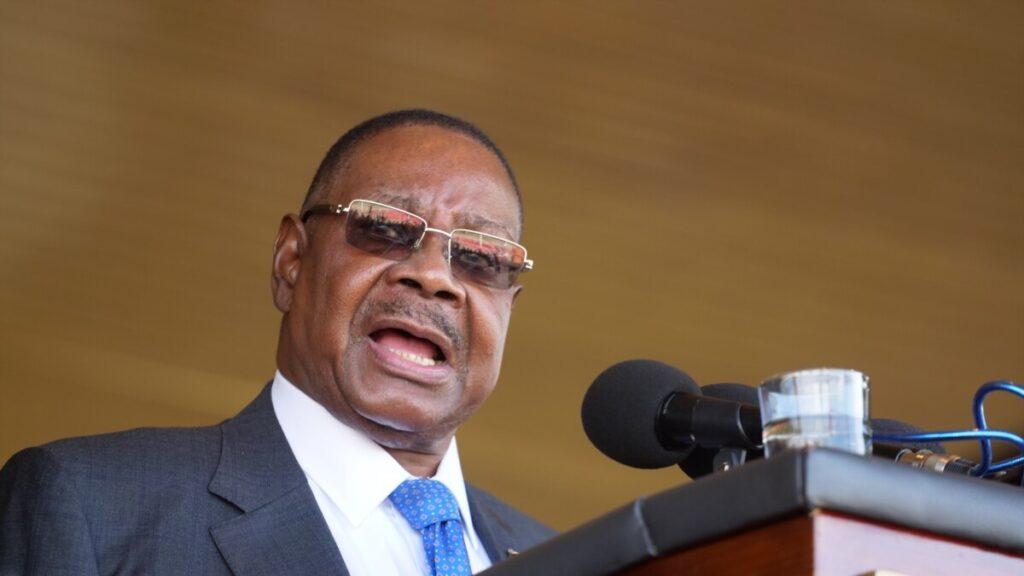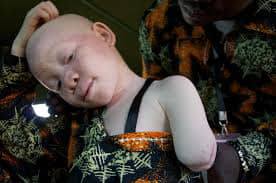Friday, June 13, marked the International Albinism Awareness Day, a global commemoration that calls for the protection, inclusion, and dignity of persons with albinism (PWAs). In Malawi, the day carries a deeper resonance, it is not just about awareness; it is about remembrance, reckoning, and resistance.
For us, this is not just a day of reflection, it is a day of pain, of memory, of grief, and of a solemn vow. We commemorated this day with heavy hearts, knowing that for far too many Malawians with albinism, peace, safety, and dignity were violently stripped away during one of the darkest chapters in our nation’s recent history.
We commemorated this day with wounds still fresh, and justice still pending.

While the world raised white flags for peace and inclusion, Malawi raised white cloths stained with blood. It is the blood of innocent men, women, and children with albinism, hunted, targeted and slaughtered under a regime that not only failed to protect them but, according to court testimonies, may have enabled their killers.
Between 2014 and 2020, Malawi witnessed a horrific wave of violence against people with albinism, an ethnic minority already struggling against systemic discrimination, marginalization, and cultural myths.
Under the presidency of Arthur Peter Mutharika and the Democratic Progressive Party (DPP), the country descended into an abyss where being born with albinism became a death sentence.
Official estimates point to over 3,000 confirmed killings, 6,000 reported disappearances, and at least 10,000 cases where people with albinism were hacked, mutilated, or left permanently disabled. These are not just statistics, they are human beings, lives extinguished because of superstitious beliefs that their bones brought wealth and political power.
This was not random violence. This was systematic, organized, and politically protected brutality.
Families were torn apart. Communities were terrorized. Some fled their homes, others locked themselves in. Children stopped going to school. People with albinism, already burdened by poor access to healthcare, education, and employment, now had to fear for their very existence.
But what was most chilling was not just the violence itself, it was the silence. The indifference. The complicity.
The silence began to crack in 2020 when, in a landmark trial at the Zomba High Court, one of the convicted murderers of a person with albinism dropped a political bombshell. Under oath, he alleged that the former president Arthur Peter Mutharika and senior DPP officials were involved in coordinating the killings and abductions.

The court, visibly shaken, took the unusual but necessary step of instructing the Director of Public Prosecutions (DPP) to investigate and prosecute those implicated — including Mutharika himself.
But five years later, no charges have been laid. No formal investigations have been opened. No justice has been served.
The implicated former president walks free, now campaigning for re-election in the upcoming September 16 presidential polls to return to the very seat of power he occupied while innocent lives were torn apart. His freedom is a daily insult to the families who still wait for justice. His candidacy is a shadow over the future of every person with albinism in Malawi.
What message does that send to the families of the victims? What message does it send to every person with albinism in Malawi? That their lives are negotiable? That their safety is conditional on political convenience?
Malawi, like many African countries, struggles with deep-rooted cultural myths around albinism. In many rural areas, it is still believed that the bones or body parts of persons with albinism can bring prosperity, power, or luck.
These myths, long rejected by science and condemned by human rights organizations, have persisted in secret, weaponized by witch doctors, ritualists, and, as recent testimonies suggest, political operatives seeking to consolidate power through blood sacrifice.
Yet even superstition cannot fully explain the scale of the killings. This was not isolated or random. It was systemic. Coordinated. Repeated.
There were clear patterns in the attacks: abductions timed with election cycles; consistent targeting of children and women; and unusual protection or interference around suspects with alleged political links.
In the face of such coordinated violence, silence from state machinery then cannot be dismissed as incompetence. It borders on collusion.

The 2020 election brought President Dr. Lazarus McCarthy Chakwera to power on a platform of human dignity, justice, and renewal. To his credit, President Chakwera made strong statements condemning violence against PWAs, increased protection in vulnerable communities, and instituted policy measures designed to restore dignity and inclusion.
Safe houses were re-established. A new PWA census was conducted. The government enhanced cooperation with the United Nations, Amnesty International, and local advocacy groups. The number of attacks dropped significantly, although the trauma lingers.
But even as the current administration tries to heal the wounds, it cannot ignore the fundamental truth: there can be no healing without justice.
The failure to prosecute those implicated, even after court orders, is a blight on our democratic conscience. It is a betrayal not only of the victims and survivors but also of the constitutional values Malawi claims to uphold.
Prosecuting Mutharika and his inner circle isn’t just a legal matter, it’s a moral emergency.
By allowing Mutharika to campaign, as a nation we are sending a chilling message: that political influence can shield you from accountability, no matter the gravity of your alleged crimes.
Imagine being a survivor of an attempted abduction, only to see the man your attacker named as “the sponsor” rallying on stages, waving at crowds, promising “restoration.” Imagine being a mother who buried her dismembered child, now watching the man you believe was responsible being treated as a “statesman.”
This is not just injustice, it is national gaslighting.
We cannot pretend to move forward while the architects of terror walk among us, rewriting history with every campaign slogan.
One of the few bright spots in this horror story has been the role played by civil society organizations, whistleblowers, journalists, and international partners. Were it not for the relentless work of groups like the Association of People with Albinism in Malawi (APAM), Human Rights Watch, and investigative media outlets, many of these crimes might have remained hidden.
But these organizations cannot do it alone. They need funding. They need legal backing. They need protection, especially in a context where naming powerful figures can be dangerous.
Malawi must do more to support and protect its truth-tellers. The cost of silence is paid in lives.
As we mark this year’s International Albinism Awareness Day, let us do more than hold vigils and marches. Let us do more than deliver speeches.
Let us act.
Although a bit late, the Director of Public Prosecutions still has space to comply with the court directive and initiate investigations into the political figures named in the Zomba testimony. The rule of law must not bend to political convenience.
There was need for Parliament to hold public hearings on the matter, allowing survivors and their families to speak. Truth must be heard, and recorded, even if justice is delayed. Probably, the coming members of the August House after September will look into this.
Political parties must also commit publicly and formally to nonviolence, and to protecting vulnerable populations, like the PWAs, during their campaigns. If I personally had the powers, no candidate who has been named in serious criminal allegations such as the murders of people with albinism should not be allowed to contest for any public position, let alone the presidency, without clearance.
Lastly, Malawians must vote with memory. Come September, we must ask: what kind of leadership are we electing? What legacy are we endorsing?
Today we remember those whose only crime was being born different, whose light skin made them targets in the shadows of ignorance and political darkness. We remember their dreams, their laughter, their names. And we say: No more silence. No more compromise. No more blood for power.
Never again.
We say: Never again.
Never again should a child live in fear because of the skin they were born in.
Never again should families have to guard their loved ones with albinism day and night, afraid of the knock on the door.
Never again should a political regime reduce human lives to ingredients for superstition and wealth.
To every person with albinism in Malawi:
We see you.
We mourn for you.
We stand with you.
And we will never stop demanding truth, justice, and protection.
May those we lost rest in peace. May their deaths not be in vain.
May their memory ignite a national fire that no regime — past or future — will ever silence.








